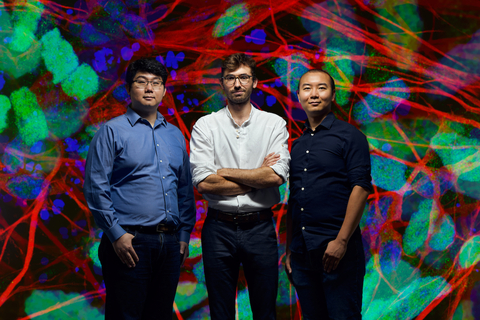BOSTON– Axoft, a neurotechnology company, today launched and announced FDA Breakthrough Device designation for its brain-machine interface (BMI) to better treat neurological disorders. The company secured $8 million in capital to fund pre-clinical studies with the FDA and to scale up prototypes of its neural implants “as soft as the brain.” The seed round investment, led by The Engine, the venture firm spun out of MIT that invests in early-stage Tough Tech companies, included investors: Ab Initio Capital, Decent Capital, Alumni Ventures, Safar Partners, AIBasis, LiquidMetal VC, Taihill Venture, AMINO Capital, Blindspot Ventures and Mintz. The capital will also be used to expand the Axoft team.
The company was founded in 2021 by CEO Paul Le Floch and CTO Tianyang Ye, alongside Assistant Professor at Harvard’s School of Engineering and Applied Sciences Jia Liu, PhD. Axoft’s novel technology was born out of Dr. Liu’s work developing materials and designs of ultra-flexible nanoelectronics to mimic the mechanical and structural properties of the brain and was further researched by Le Floch while he was completing his PhD at Harvard in Mechanical Engineering and Material Sciences. The novel implants they developed are gliosis-free. In other words, the implants can reside in the central nervous system for the long term without harm. Axoft’s implants also exhibit electrical stability to track brain signals over the long term, and deliver an ultra-high density of sensors to maximize the information that can be exchanged between the brain and electronics.
“Technology leaps in the semiconductor industry, development of novel advanced materials, chip design improvements, and progress in minimally invasive surgical approaches have opened opportunities for neurotechnology to be brought into the clinic and really help patients,” said Paul Le Floch, Axoft co-founder and CEO. “The pursuit of elevated quality of life, compounded by the increasing financial burden of neurological disorders due to an aging population are driving the demand for less invasive, more powerful neurological tools.”
A recent report from the World Health Organization estimates that roughly nine million people die each year from neurological disorders, and that 1 in 3 people will develop a neurological disorder at some point in their life, making neurological disorders the leading cause of disability and the second leading cause of death globally.
Today’s BMIs have not been developed to fully exploit the brain’s potential and are limited by the mechanical mismatch between electronics and brain tissues. Even ultra-thin wires are stiff, unlike brain tissue, and pose the danger of scarring and infection to the local brain region in which they are embedded. Axoft solves this issue by using a bioinspired material, malleable yet resilient, to make high density (large electrode count) probes with long-term stability and biocompatibility in the brain.
Axoft’s minimally invasive implants create a seamless interface with the nervous system, allowing ultra-high bandwidth and stable, single-neuron measurements. Whereas current implants have limited longevity and ability to track the same neurons in the brain over time, Axoft’s implant material enables it to stay functional as the brain shifts or grows, minimizing the need for replacement and offering a long-term BMI to seamlessly connect the brain to electronics. Future applications in neuroprosthetics, like brain-control of man-made systems with large number of degrees of freedom, or real-time speech prediction, and in closed-loop neuromodulation for the treatment of movement disorders, memory loss and epilepsy, require communication with a large number of neurons in the brain. Currently approved systems are limited to 16-96 electrodes, which is not enough to enable these applications, and systems under development that have higher channel count typically sacrifice biocompatibility for bandwidth. Axoft’s implants are made of materials 10,000x softer than flexible electronics and can embed up to 1024 electrodes in a single strand thinner than a credit card.
Participation in the FDA Breakthrough Devices Program will speed the development, assessment and review of Axoft technology while preserving the standards for premarket approval and clearance for protection of public health. The company will introduce its technology in a staged approach, with the primary focus on improving quality of life; first addressing illnesses that have large patient populations that are underserved by current medical technology as well as diseases such as pediatric CP and epilepsy where patients undergo treatment for life-long conditions.
Axoft also announced The Engine’s General Partner Reed Sturtevant joined its Board of Directors. Sturtevant said: “Axoft is taking a dramatic step forward from the fundamental brain-computer interface technologies and could be relevant for many conditions. This has the potential to be analogous to a pacemaker for the brain – a minimally invasive device that can listen, sense and stimulate a response. Imagine the impact this will have on neurodegenerative conditions like Parkinson’s and Alzheimer’s diseases, seizures and movement disorders.”






